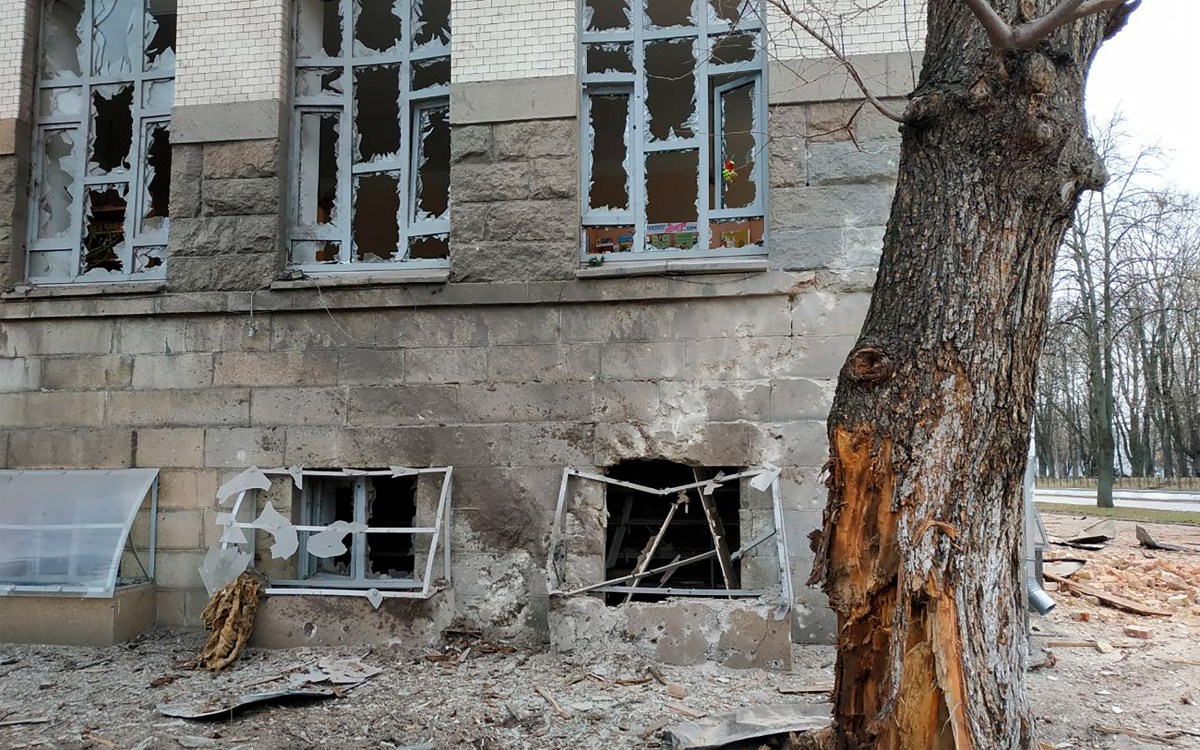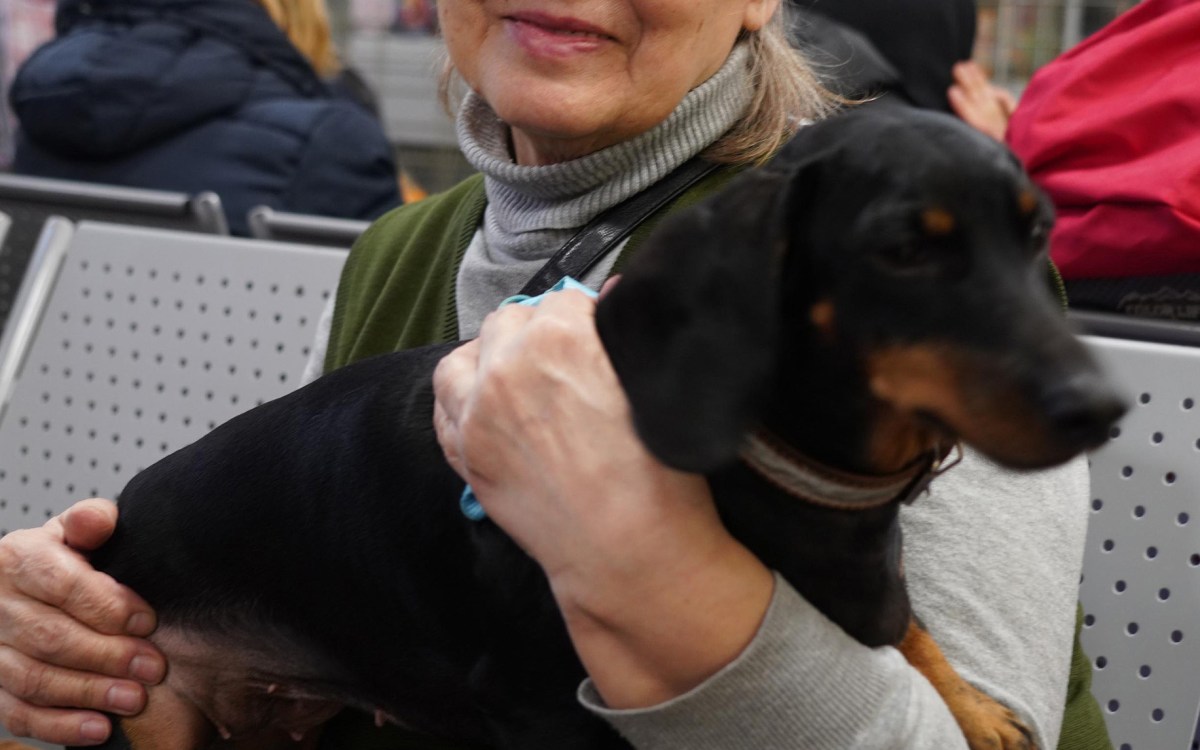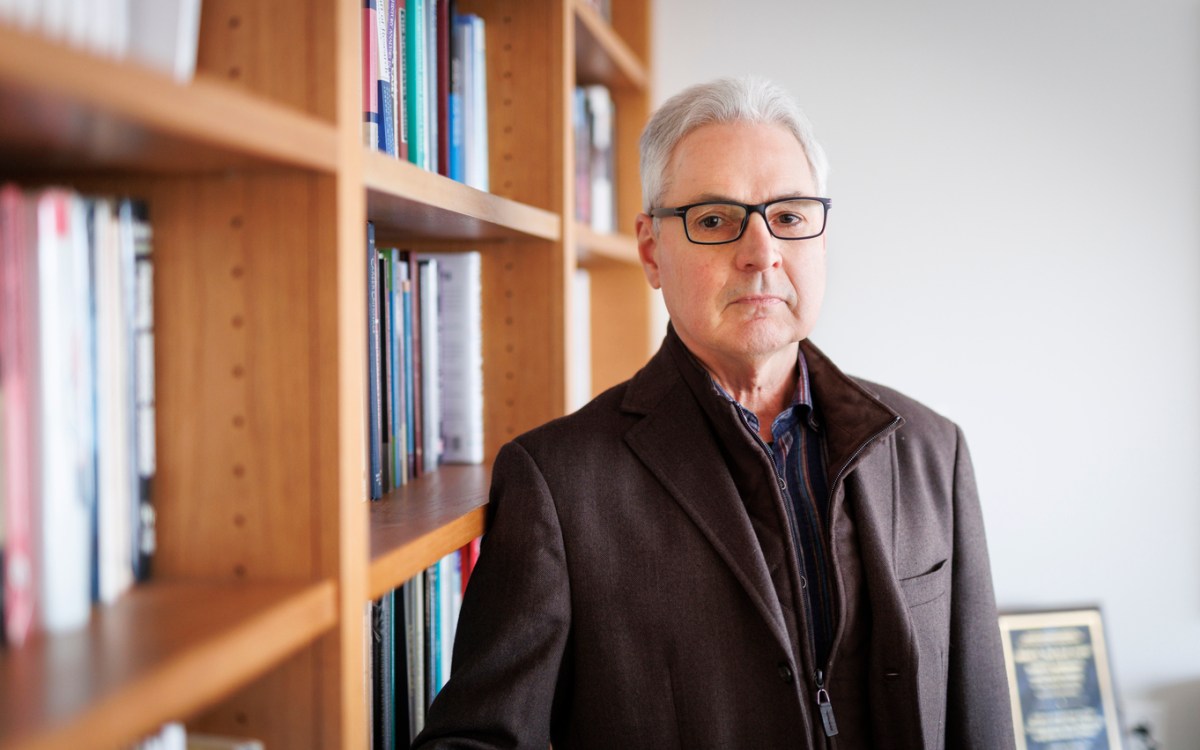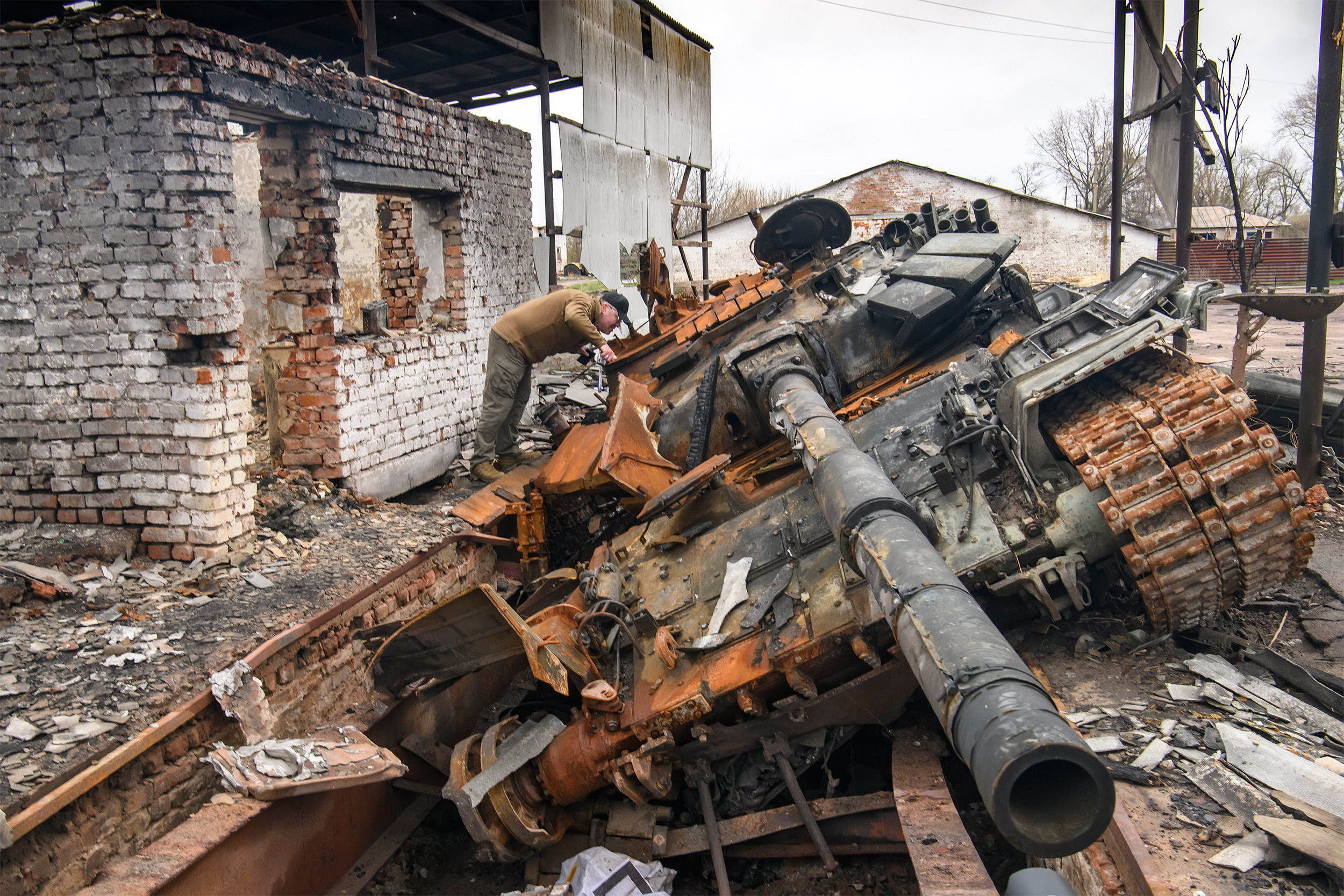
A Russian T-72 tank destroyed in the city of Chernihiv, Ukraine.
Maxym Marusenko/NurPhoto via AP
How war in Ukraine is reshaping global order
Former U.S. envoy sees NATO getting stronger, more unified, with Russia on track to become diminished, pariah state, China in tough spot
The political, economic, national security, and humanitarian reverberations from the eight weeks of war between Russia and Ukraine are already beginning to reshape the global order as the conflict enters a brutal new chapter, with fighting concentrated in the southeast of Ukraine. To better understand the changes taking place, the Gazette spoke with Ambassador Douglas Lute, M.P.A. ’83, a decorated (retired) U.S. Army lieutenant general who from 2013 to 2017 served as U.S. Permanent Representative to NATO, where he played a leading role in NATO’s responses to its top European security challenges. Lute has been a longtime fellow at the Belfer Center at Harvard Kennedy School. Interview has been edited for clarity and length.
Q&A
Douglas Lute
GAZETTE: How is the Russian invasion changing NATO? Sweden and Finland appear poised to become members after decades of inaction. If they join, what effect would that have on Russia?
LUTE: We’re only two months into this and NATO is a big 30-nation bureaucracy, so it doesn’t move swiftly. But some things are already apparent. First, one of the effects will be that NATO will posture NATO forces on NATO territory farther east, and in larger numbers, than they had previously. After the Russian invasion [of Crimea] in 2014, NATO put modest forces in the three Baltic states and Poland. And now, I think, it will do so south of those four, in Poland, Slovakia, Romania, and Bulgaria. So, there’ll be this sort of eastward shift and eastward strengthening of NATO forces.
The second thing is that it’s entirely likely that by the NATO Summit at the end of June this year, Sweden and Finland will be invited to join. The process begins some months down the road that results in them being added to the membership, but the initial steps will become probably the most historic deliverables of the Madrid summit. So, I think we’ll go from 30 allies to 32 this summer. That’s a long-lasting, nearly permanent change.
Defense spending and defense investment among the 30 allies today is likely to spike. Most prominent is German defense spending. The largest economy in Europe has probably committed to change perhaps a 30-year pattern of marginal defense spending, and they’ve agreed to move their defense spending up by €100 billion this year and then, in out years, annually spend 2 percent of their GDP on defense, which would make them the largest defense budget in Europe and would really energize European defense spending, something successive American presidents have argued for going back as far as Eisenhower.
Finally, outside of the NATO realm, but also significant in terms of security, is that I think we’ll see a steady movement away from Russian energy sources. The EU is still deliberating on whether and how fast to cut its current reliance on Russian resources, oil and gas in particular. Those would be major enhancements of the sanctions regime against Russia. I am hopeful that our European friends and partners and allies will take that step.
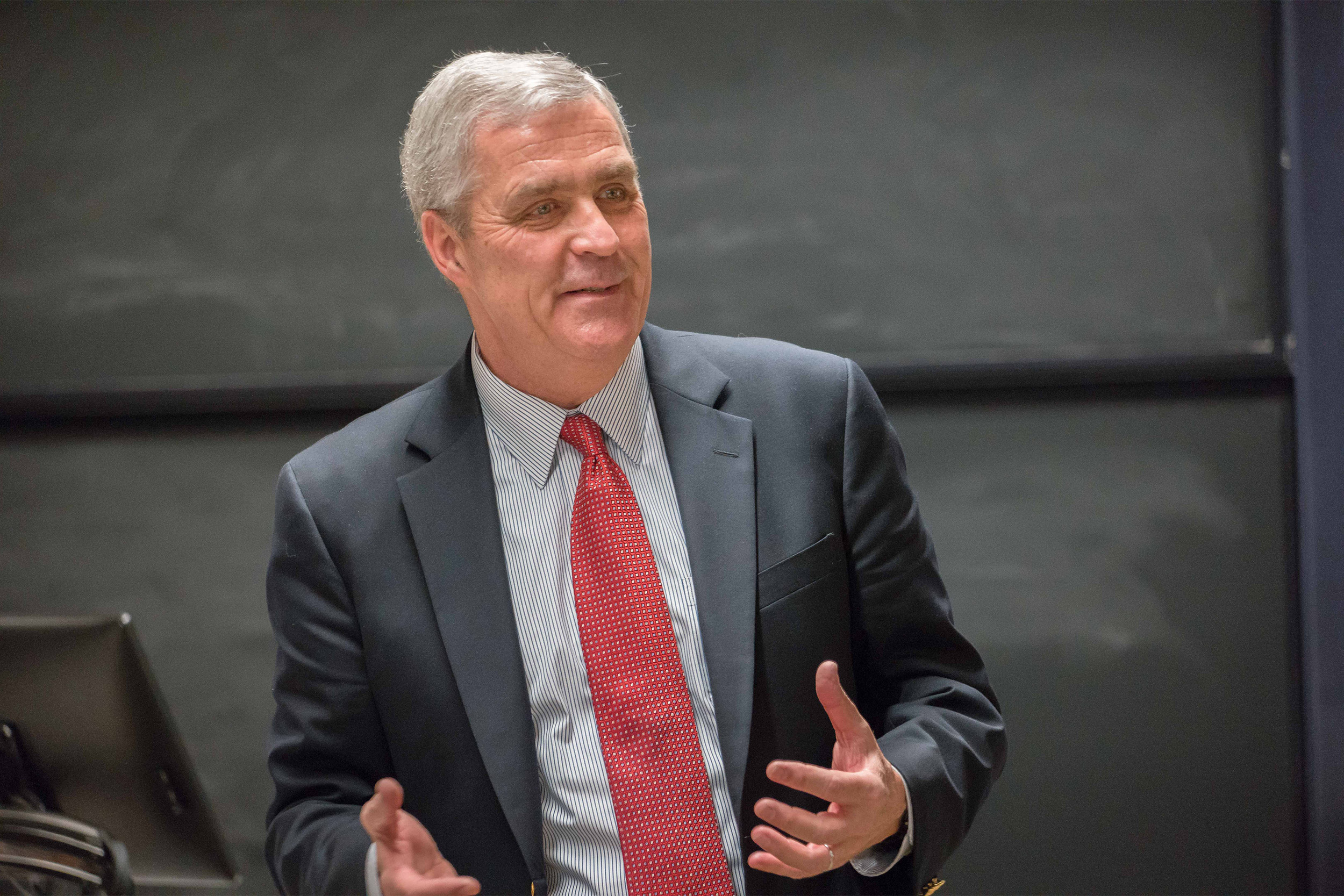
“Going forward, it’s quite clear that Russia, under Vladimir Putin, will be a pariah state,” says Douglas Lute. “It will be as isolated politically and economically as we can make it …”
Courtesy of Belfer Center
GAZETTE: Would any of these actions have taken place if Russia had not invaded Ukraine?
LUTE: It is safe to say that none of this would have occurred. From President Putin’s list of demands before the invasion in February, you can see the kind of strategic effects he’s had. He complained about NATO enlarging its membership to the east, and now he’s going to achieve two more states joining that list. He argued against NATO force deployments, and he’s going to see more of that. So, he’s had a decidedly non-strategic impact on his own interests by way of this invasion.
GAZETTE: In what ways is this conflict starting to reshape the global order? Which factors will be most determinative of that outcome?
LUTE: It’s very early, so these strategic moves take a while. But in my view, this invasion and the Western response to it will be as significant a geostrategic inflection point as the 9/11 attacks were 20 years ago. I think we’re going to be living with the repercussions of this invasion for perhaps 10 or 20 years.
Going forward, it’s quite clear that Russia, under Vladimir Putin, will be a pariah state. It will be as isolated politically and economically as we can make it and will not return to anything that looks like pre-invasion [Russia]. This will be equally evident in the economic arena. Obviously, Russia depends for revenues on gas and oil, and there’s going to be a major market shift away from the Western markets. Now, it’s too soon to know what that means. It may mean that prices spike and, in the near term Russia increases its revenues. In fact, we’ve seen a bit of that in the first two months. You could also see the Chinese and others who are not abiding by the Western-imposed sanctions, they could benefit from this by way of energy deals, trying to make up for the deals that Putin has lost elsewhere.
A really important thing to watch will be the countries that are sitting on the fence. So, as this persists and as evidence of atrocities continues, as the refugees continue to flow out of Ukraine, and who knows what lies ahead in terms of Russian actions — what’s the impact on China, most significantly, but also important states like India and Brazil, and so forth. There are important players here who haven’t yet actually declared their hand. Among those three, China, India and Brazil, China is probably most closely, at least rhetorically, aligned with Putin, so far.
GAZETTE: Most of the fighting has migrated to eastern and southeastern Ukraine. Do you see anything happening that could accelerate or even upend any of the trend lines that you’ve been talking about?
LUTE: We’re transitioning from Phase One, which was in and around Kyiv and which the Ukrainians won, and Phase Two, in the so-called Donbas region. We’re between phases right now, with both sides catching their breath. Going forward, we can expect that the Ukrainians will continue to outperform Russia on the battlefield. And I say this, despite, on paper, the physical advantage of the Russian forces. But I’m reminded of the old military tenet that when in war, the moral is to the physical as 3 is to 1. That’s a Napoleon quote. What he meant was that the non-quantifiable, the intangible factors, like morale, cohesion, leadership, discipline, and so forth, typically outweigh the physical factors, like numbers of tanks, number of fighter aircraft, and so forth. And in all those factors, Ukraine has a quite decided advantage. So, I think the Ukrainians will win out. The question is, how ugly is it? How brutal is it? What’s the cost and where do we end up? Do we end up with a frozen conflict where the battlefield is stalemated, Russian forces continue to occupy parts of territorial Ukraine, or are Ukrainian forces able to evict Russian forces from the east and the south? It’s just too soon to tell.
GAZETTE: If Russia becomes a pariah state, like North Korea, what does Russia’s future look like?
LUTE: By pariah state, I mean that virtually all meaningful economic contacts, market connections and so forth with Russia would be broken, which would devastate the Russian economy. We would be unwinding 30 years of economic integration of Russia into the global economy.
GAZETTE: Haven’t the sanctions since February already done significant damage?
LUTE: We’re two months into that, but there are things we haven’t done. Our European allies, EU partners, have not ended their energy dependence on Russia. That would be huge and that’s a major step. We’ve cut off some financial channels with some Russian banks, but not completely. As bad as it is, and these are historically severe economic sanctions, there are more steps we can take on the economic front. And then politically, their leadership will not be able to travel outside of Russia. They will be completely isolated for as long as Putin is president. I don’t see that changing.
Militarily, this will have an interesting impact which will be worth watching. Because of the incompetence of the Russian forces in Ukraine, I think Russia will increasingly rely on nuclear forces as the ultimate “guarantor” of its security. And Russian threats against Finland joining NATO seem now kind of hollow because Russia is being defeated by Ukraine. So, what conventional threat does Russia pose to NATO? And does this allow NATO to shift to the next generation of emerging technologies, to spring ahead and take advantage of the fact that Russia’s demonstrated that they’re not 10 feet tall?
GAZETTE: How will a diminished Russia impact the countries that seem, at least for now, to be standing by Russia, like China, India, Brazil, and several in the Middle East?
LUTE: The biggest potential impact is on China and China’s relationship with others. It’s conceivable that China would look at the unified Western response against Russia and take that as a warning that any overt aggression would face a similar unified Western response. And, of course, the Chinese economy is just as dependent on the global economy as the Russian economy was before the invasion. I am hopeful that President Xi [Jinping] and the Chinese Communist Party are watching this and this may have a deterrent effect on China if it has ambitions of territorial aggression. I ran the math recently: The international sanctions regime includes 44 countries and 60 percent of global GDP. That’s huge. And this is without China, which is about another 20 percent of global GDP. So, you can imagine President Xi and his economic team sitting down and saying, “Wait a second. We don’t want to be in that position.”
GAZETTE: No country, not even China, can survive if cut off from 60 percent of the global economy, I would imagine.
LUTE: No, they can’t. And so, if Professor Joe Nye has been right for the last 20 years, that interdependence and these interconnections in the world serve not only for prosperity and well-being, but also serve a deterrent effect against major aggression, then maybe we’re going to see that play out in this episode.




